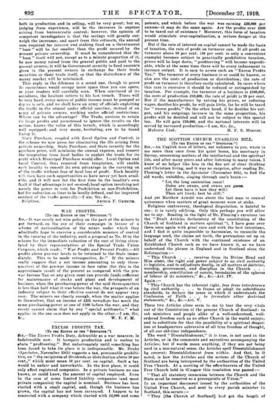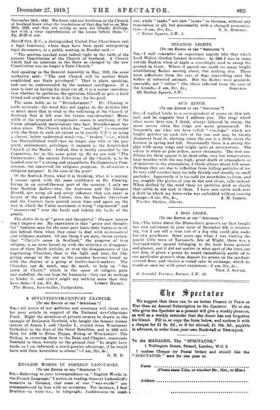THE SCOTTISH CHURCH ENABLING BILL.
[To THE EDITOR or THE " SPECTATOR.") SIR,—An English man of letters, not unknown to you, wrote to me more than once from his quiet home, his sanctuary in Surrey, concerning matters of the intellectual end the spiritual life, and after many years and after listening to many voices, I know of no helper like him in the fine art of clear thinking and Christian living, and it was no surprise, after reading Dr. Fleming's letter in the Spectator (November 8th), to find the old words, unbidden, singing through one's brain :— "Let the long contention cease!
Geese are swans, and swans are geese.
Let them have it how they will!
Thou art tired; best be still."
And yet Matthew Arnold was about the last man to counsel quiescence when matters of great moment were at stake.
Religious controversy, theological disputation, is hateful to one: it is rarely edifying. Only this perhaps you will allow me to say. Reading in the light of Dr. Fleming's excursus (on the "Draft Articles declaratory of the constitution of the Church of Scotland in matters spiritual "), I have gone over them once again with great care and with the best intentions, and I find it quite impossible to harmonize, to reconcile the language used, the claims set forth, the pretensions set up on behalf of the Church with the continued existence of an Established Church such as we have known it, as we have understood the phrase in England and in Scotland since the Reformation :-
" This Church . . . receives from its Divine Head and Him alone, the right and power subject to no civil authority tl legislate, and to adjudicate finally, in all matters of dobtrine, worship, government, and discipline in the Church . . . membership, constitution of courts, boundaries of the spheres of labour of its ministers," &c., &c.—Art. IV.
Again:— " This Church has the inherent right, free from interference by civil authority . . to frame or adopt its subordinate standards, to declare the sense in which it understands the Confession of Faith . . . to formulate other doctrinal statements," &c., &e.—Art. V.
These two Articles alone seem to me to tear the very vitals out of the Constitution of the present Church of Scotland: to rob ministers and people alike of a well-understood, well- ordered freedom such as no other Church in the world enjoys; and to substitute for that the possibility of a spiritual despot- ism at headquarters subversive of all true freedom of thought, of all our old-time independence.
The word "Disestablishment," it is true, is not used in the Articles, or in the comments and narratives accompanying the Articles; but if words mean anything, if they are not being used in a non-natural sense, the. Articles spell. Disestablishment by consent; Disestablishment from within. And that, be it noted, is how the Articles and the actions of the Church of Scotland are being interpreted by the authorities of the United Free Church. At a meeting of the office-bearers of the United Free Church held in Glasgow this resolution was passed:—
"That all statutory connexion between the Church and the State must be removed as a prerequisite of Union."
In an important document issued by the authorities of the United Free Church, and sent to every parish minister is Scotland, this occurs :-
". They [the Church of Scotland] licd got the length of November 24th, 1842. We know and our brethren in the-Church of Scotland know what the resolutions; of that day led to on May 18th, 1843, and they are acting as men not blindly drifting, but with a clear apprehension of the issues before them."— Pp. 28-29 et sub.
Sheriff Orr, K.C., a distinguished United Free Churchman and a legal luminary, whose days have been spent interpreting legal documents, at a public meeting in Dundee said :- " The position reached went indeed right in the teeth of the present Constitution of the Church of Scotland. A Church which had its relations to the State so changed by the new Constitution was no longer a State Church."
And speaking in the General Assembly in May, 1919, the same authority said " The new Church will be neither state established nor State privileged." That is plain speaking, and can be understanded by the meanest intelligence. If a man is bent on having his head cut off, it is a minor considera- tion whether he performs the operation himself or gets a kind friend and neighbour to do it for him : for his good.
The same holds as to "Disendowment." Dr. Fleming is quite accurate: the word does not appear in the Articles like so much more that is vital to the well-being of the Church of Scotland that is left over for future consideration Mean- while if the proposed arrangement comes to anything, if the Union adumbrated materializes into fact, Disendowment has taken place. The Church which has " modified " its concordat with the State to such an extent as to justify U.F.'s in using a clearer, better understood word—viz., " broken "—i.e., which has Disestablished itself—has no longer any title to the pro- perty, endowments, privileges, it enjoyed as the Established Church of the Realm. Indeed, this is tacitly conceded by the Committee, for in the same print (p. 31) we are told " The Endowments : the ancient Patrimony of the Church, is to be handed over to " a strong and sympathetic Parliamentary Com- mission, but conserved for religious purposes. Is education a religious purpose? Is the care of the poor?
Of the Scottish Press, what it is thinking, what it is saying, I cannot speak with the same confidence as Dr. Fleming. Living in an out-of-the-way part of the country, I only see four Scottish dailies—two, the Scotsman and the Glasgow Herald, are using all and every influence they can exert in favour of the proposed Union; two, the Dundee Advertiser and the Courier, have poured scorn time and again on the way in which the Union movement is being "engineered" and " manoeuvred " over the heads and behind the backs of the people.
The obiter dicta of "grave and thoughtful" Glasgow laymen don't impress me. My experience is that "grave and thought- ful" business men for the most part leave their business facul- ties behind them when they come to deal with ecclesiastical and religious matters. Of one thing I am sure, thrice certain, that " Christ's cause in Scotland," the progress of true religion, is no more bound up with the criticism or disappear- ance of these Draft Articles, or even the disappearance of the negotiating Churches, than is the light and heat, the life- giving energy of the sun in the noonday heavens bound up with the chatter of a group of lucifer-match-makers. The Churches can do much, may do much, to help on " the cause of Christ," which is the cause of religion pure and undefiled, the one hope for humanity : they can do nothing to hinder it, and cynics might say nothing more than they have done.—I am, Sir, &c., ANDREW MALDEN. The Manse, Inrerkeilor, Forfarshire.



























 Previous page
Previous page